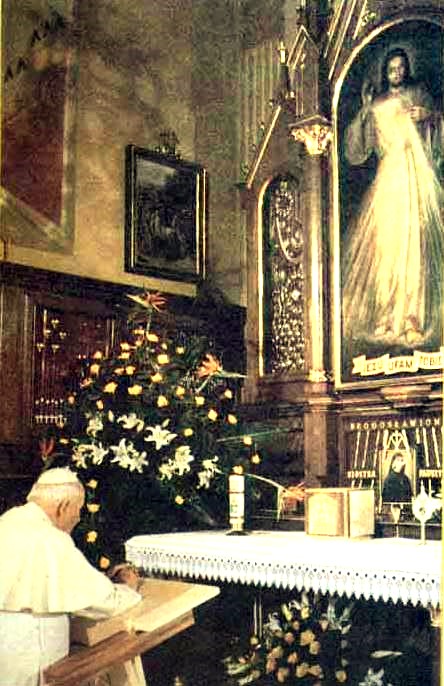
Pope John Paul II praying before an image of Jesus, the Divine Mercy
On April 30, 2000, Pope John Paul II canonized the Polish nun who had received from Christ the amazing revelations of the Divine Mercy in the early years of the twentieth century, Saint Mary Faustina Kowalska.
During that ceremony, the pope fulfilled one of the requests that Christ had made through those revelations: that the entire Church reserve the Second Sunday of the Easter Season to honor and commemorate God’s infinite mercy.
On April 2, 2005, the eve of Divine Mercy Sunday, our beloved Pope John Paul II, returned to the Father’s house.
Today, 9 years later we celebrate his being canonized a saint, along with his predecessor, Pope John XXIII. What a beautiful blessing for Divine Providence to smile for us in this way, presenting the Church with this gift of two great saints on this beautiful occasion!
Let’s thank Heaven for it!
Where do we see the Divine Mercy revealed in today’s Readings?
First of all, we see it in the reaction Christ shows to those men, his chosen Apostles, who had abandoned him just two nights before.
They had abandoned Jesus in his most difficult hour, but Jesus wasn’t going to abandon them.
He passes through the locked doors, passes through their fears, regret, and guilt, and appears to them. He hasn’t given up on them. He brings them his peace. And he reaffirms his confidence in them by reaffirming their mission: “As the Father has sent me, so I send you.”
We also see God’s mercy in Christ’s reaction to the men who had crucified him.
Does he crush them in revenge? No.
Instead, he sends out his Apostles to tell them – and to tell the whole sinful world, the world that had crucified its God – that they can be redeemed, that God has not condemned them: “As the Father has sent me, so I send you.” And then, just to make sure that the Church is fully armed to communicate this message, Jesus gives the ultimate revelation of God’s mercy — he delegates to his Apostles his divine power to forgive sins: “Receive the Holy Spirit. Whose sins you forgive are forgiven them, and whose sins you retain are retained.”
This is the explicit institution of the sacrament of Confession, the sacrament in which the limitless ocean of God’s mercy overwhelms the puny ocean of our misery.
It was the ultimate revelation of the Divine Mercy.
[Source: adapted from ePriest.com]
Pingback: TODAY:-Not just ‘another’ Sunday… | 1catholicsalmon
Heard about the promises made concerning the devotion to Diving Mercy and I have to say, it is now one of my new favorites! Practically a second Baptism every year.
It’s a beautiful devotion. I love the Divine Mercy chaplet. A very simple prayer that grows on you and brings great peace of soul.
Means so much to me! I didn’t come to know of Divine Mercy until 2005 following the death of John Paul II, via EWTN. I’m so grateful.
It’s a beautiful and simple devotion. God gives us wonderful gifts all the time. I think the Divine Mercy is one of the great blessings of the 20th (and 21st) Century.